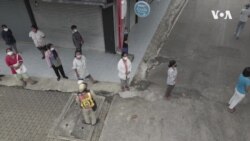ອຸດສາຫະກຳການທ່ອງທ່ຽວຂອງ ໄທ ປະກອບເປັນປະມານ 20 ເປີເຊັນຂອງ ຍອດຜະລິດຕະພັນລວມພາຍໃນຂອງປະເທດ. ໃນຂະນະທີ່ການຫ້າມຕ່າງໆໄດ້ ຜ່ອນເບົາລົງ, ພະນັກງານທັງຫຼາຍໃນອຸດສາຫະກຳການບໍລິການ ແມ່ນກຳລັງ ປະເຊີນກັບຄວາມຫຍຸ້ງຍາກທີ່ເພີ່ມຂຶ້ນດ້ວຍເງິນທີ່ທ້ອນໄວ້ໝົດກ້ຽງ ແລະ ໜີ້ ສິນເພີ່ມຄູນຂຶ້ນ. ນັກຂ່າວວີໂອເອ ສຕີຟ ແຊນຝອດ ມີລາຍງານຈາກຈັງຫວັດ ກະບີ່, ເຊິ່ງ ພຸດທະສອນ ຈະນຳລາຍລະອຽດມາສະເໜີທ່ານໃນອັນດັບຕໍ່ໄປ.
ການລຽນແຖວຮັບອາຫານໃນປະເທດ ໄທ ແມ່ນໄດ້ກາຍເປັນເລື່ອງທົ່ວໄປຫຼາຍ ຂຶ້ນ ໃນຂະນະທີ່ການກັກບໍລິເວນໄດ້ເຮັດໃຫ້ແຮງງານຫຼາຍຄົນ ບໍ່ມີວຽກງານ ພ້ອມກັບບໍ່ມີລາຍໄດ້ເປັນເວລາຫຼາຍວັນ, ໂດຍສະເພາະແມ່ນພາກສ່ວນການ ທ່ອງທ່ຽວ.
ທຸລະກິດຊຸມຊົນ ແມ່ນກຳລັງເຂົ້າຮ່ວມໃນການຊ່ວຍຊົດເຊີຍການຊ່ວຍເຫຼືອທີ່ຈຳກັດຂອງລັດຖະ ບານ, ດ້ວຍການສະໜອງອາຫານ ແລະ ວັດຖຸທີ່ຈຳເປັນໃຫ້ຄົນທີ່ມີຄວາມຕ້ອງການ.
ທ່ານ ຍອດຊາຍ ຈຸສານກຸນ ຜູ້ບໍລິຫານສື່ມວນຊົນ ໄດ້ກ່າວວ່າ “ເວລານີ້ພວກ ເຮົາໄດ້ເຫັນຢ່າງຈະແຈ້ງແລ້ວວ່າ ພະນັກງານທີ່ເຮັດວຽກຢູ່ໂຮງແຮມ, 100 ເປີເຊັນແມ່ນໄດ້ສູນເສຍວຽກງານ ເພາະວ່າເຂົາເຈົ້າບໍ່ໄດ້ຮັບອະນຸຍາດໃຫ້ເປີດ ຄືນເທື່ອ. ແລະ ພະນັກງານເສີບຢູ່ຮ້ານອາຫານ, ໂດຍສະເພາະຮ້ານຊີ້ນດາດ, ແມ່ນບໍ່ສາມາດເປີດໄດ້ເພາະວ່າປະຊາຊົນບໍ່ສາມາດນັ່ງ ແລະ ກິນດື່ມ. ພ້ອມກັບບາ ແລະ ພັບທັງໝົດແມ່ນໄດ້ຖືກປິດ.”
ດ້ວຍຄຳສັ່ງພາວະສຸກເສີນຂອງ ໄທ ໄດ້ຖືກຂະຫຍາຍອອກໄປຈົນຮອດທ້າຍເດືອນມິຖຸນານັ້ນ, ການຂາດແຄນລູກຄ້າຈະໝາຍເຖິງການສູນເສຍລາຍໄດ້ຢ່າງຫຼວງຫຼາຍ ສຳລັບຫຼາຍຄົນ.
ສຳລັບຜູ້ທີ່ເປັນແມ່ຄືທ່ານນາງ ອໍຣະຈອນ, ຜູ້ທີ່ຫາເງິນມາລ້ຽງຄອບຄົວ, ແມ່ນບໍ່ມີທາງເລືອກທີ່ຈະຢູ່ໃນບ້ານ, ບໍ່ວ່າລາວຈະແຂງແຮງ ຫຼື ບໍ່ສະບາຍກໍຕາມ.
ທ່ານນາງ ອໍຣະຈອນ ສຣິສາກຸນ, ແມ່ຄົວຮ້ານອາຫານ ກ່າວວ່າ “ຂ້າພະເຈົ້າ ຕ້ອງອອກຈາກບ້ານ. ຂ້າພະເຈົ້າຢູ່ບ້ານບໍ່ໄດ້ເພາະວ່າເຮົາບໍ່ມີເງິນ. ບາງເທື່ອຂ້າພະເຈົ້າທ້ອນເງິນໄດ້ໜ້ອຍນຶ່ງ ທີ່ຕ້ອງ ການເພື່ອຊື້ນົມ ແລະ ຜ້າອະນາໄມ ສຳລັບຫຼານຂອງຂ້າພະເຈົ້າ. ຂ້າພະເຈົ້າມີຫຼານສອງຄົນທີ່ຕ້ອງໄດ້ກິນອາຫານ.”
ນັກບັນເທີງ ແລະ ນັກສິລະປະທີ່ບໍ່ມີວຽກເຮັດບາງຄົນ ແມ່ນກຳລັງໃຊ້ເວລາ ຫວ່າງຂອງເຂົາເຈົ້າເພື່ອສ້າງໂອກາດວຽກງານໃໝ່ ເພື່ອມີລາຍໄດ້ພໍປະຄອງຊີວິດ.
ນັກດົນຕີທີ່ມີຊື່ສຽງທ່ານ ຈອຍ ປີຢະສັກ ໄດ້ເລືອກທີ່ຈະຮັບເອົາກຸ່ມຄົນທີ່ນ້ອຍລົງ, ດ້ວຍການປ່ຽນບາເສບດົນຕີສົດ ມາເປັນຫ້ອງສະແດງພາບສິລະປະ.
ນັກສິລະປິນດັ່ງກ່າວມີແຜນທີ່ຈະບໍລິຈາກລາຍໄດ້ຈາກການຂາຍພາບ ເພື່ອຊ່ວຍເຫຼືອຜູ້ເຄາະຮ້າຍໄວຣັສໂຄໂຣນາ ແລະ ຄອບຄົວຂອງເຂົາເຈົ້າ.
ທ່ານ ຈອຍ ປີຢະສັກ ກ່າວວ່າ “ຂ້າພະເຈົ້າບໍ່ມີຄວາມຄາດຫວັງຫຼາຍ ສຳລັບທຸລະກິດດົນຕີ ເພາະວ່າມັນບໍ່ມີອະນາຄົດທີ່ແນ່ນອນ ກ່ຽວກັບ ກົດລະບຽບບັນເທີງ. ສະນັ້ນຂ້າພະເຈົ້າຄິດວ່າ ວຽກງານດ້ານສິລະປະທີ່ພວກເຮົາກຳລັງເຮັດດຽວນີ້, ພວກເຮົາສາມາດເອົາໃສ່ໃນສະຖານທີ່ຂອງພວກເຮົາ ແລະ ເລີ່ມຫ້ອງວາງສະແດງຮູບພາບສິລະປະຢ່າງຊ້າໆ ເພາະວ່າມັນແມ່ນສິ່ງທີ່ທີ່ພວກເຮົາຕ້ອງປັບໂຕ ເຂົ້າກັນ.”
ໃນຂະນະທີ່ປະເທດ ໄທ ກ້າວໄປໜ້າເພື່ອເປີດເສດຖະກິດຕໍ່ໄປ, ໃນຂະນະທີ່ກໍລະນີໄວຣັສໂຄໂຣນາໄດ້ຫຼຸດລົງນັ້ນ, ມັນຍັງຄົງບໍ່ມີຄວາມແນ່ນອນວ່າ ມັນຈະສົ່ງຜົນກະທົບຕໍ່ຊີວິດການເປັນຢູ່ຂອງພວກພະນັກງານ ກຳມະກອນແນວໃດ.
Thailand’s tourism industry accounts for about 20% of the country’s Gross Domestic Product. As restrictions ease, many workers in the service industry are facing a growing struggle, with depleted savings and rising debts. Steve Sandford reports from Krabi.
Food lines in Thailand have become more common as the lockdown has left many day laborers jobless with no income, especially in the tourism sector.
Community businesses are joining in to help offset limited government aid, providing meals and essential goods to those in need.
“Right now we see clearly the staff that works at hotels, 100% of them all lose jobs because they’re not allowed to open yet. And waitresses at restaurants, especially the BBQs, can’t open because people can’t sit down and drink. Also bars and pubs are all shut down.”
With Thailand’s emergency decree extended until the end of June, a shortage of customers means a drastic cut in revenue for many.
For mothers like Aorachorn, who supports an extended family, there is no option to stay home, whether healthy or sick.
“I have to leave the house. I can’t afford to stay home because we don’t have money. Sometimes I earn small savings of money that I need to buy milk and diapers for my grandchildren. I have two grandchildren who need to eat.”
Some unemployed entertainers and artists are using their spare time to create new job opportunities to make ends meet.
Popular musician Choy Piyasak has opted for smaller crowds, converting a live music bar to an art gallery - with a touch of good will.
The artist plans to donate proceedings from gallery sales to help COVID victims and their families.
“I don’t have much expectations for the music business because there is no clear future on entertainment regulations. So I think the artwork that we are now doing, we can put in our space and slowly start an art gallery because it is a new thing for us to adapt to.”
As Thailand moves forward to further open the economy, as COVID cases drop, it remains unclear how it will affect the livelihood of workers.





